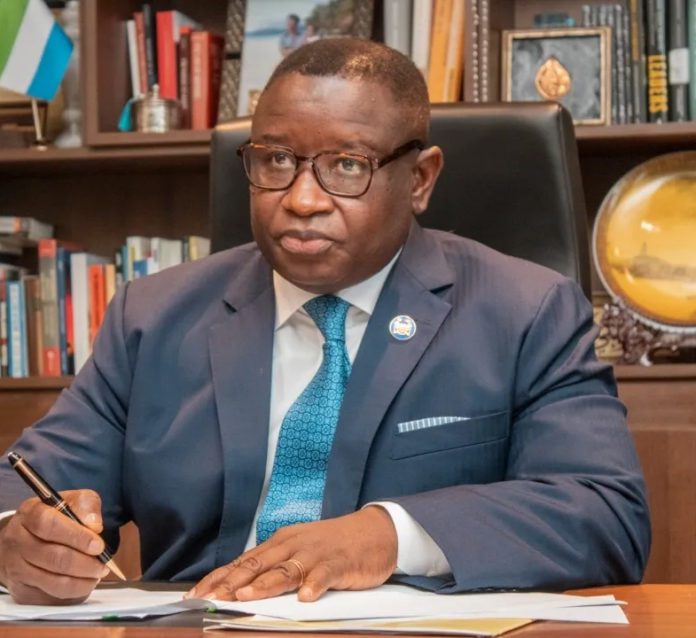

Will Bio’s government reconsider its development commitments?
By Mahmud Tim Kargbo
I embarked on writing this article with a personal subscription and signature to rethink development commitments in order to create a better and more sustainable Sierra Leone dialogue for an equal partnership. In reflexivity, I am tempted to view this notion as a wishful thought in the utopia of eighteenth-century Marxism in relation to our current and modern reality. Nevertheless, I believe in “change” for a “better” life in a “better” world on a global scale.
Herein lies the argument that I would like to stretch my argument further to include emancipation from global, regional, and national structures of oppression and repression in all their forms and manifestations.
It is a solid and valid point of fact that aid is also usually and always “tied to procurement from donor countries.”
Recent statistics suggest that in 2018, approximately 75% of British food aid was channelled through NGOs; 40% of emergency aid from Sweden was channelled through Swedish NGOs; and about 65% of US aid (excluding food aid) was channelled similarly. The author admits that food aid may be necessary under certain conditions, but if the factors that created such emergencies are not addressed fully, such aid can be counterproductive.
• “Development is a process of self-empowerment and an integral part of the overall process of the struggle for liberation from the global structures of dominance and control in terms of both ‘mental constructs and use of language’.”
• “Aid being tied to the purchase of goods and services by the donor country increases overall costs by 25%. Moreover, most donors channel aid through NGOs from within their own countries.”
• Neoliberals think of development as growth (open markets, foreign investments, and good governance as defined by donors) and wealth accumulation (making sure the rich get richer). But from the point of view of developed countries, development is also about social factors (people’s well-being) plus the democratic factor (people’s right to take part in decision-making) minus the imperial factor (people’s right to self-determination).
Thus, dependency theory, which often leads to the suspicion of “conspiracy”, is vital and indeed becomes a tool necessary for critical evaluation and assessment.
A fascinating aspect of “ending dependency” is the hypothesis that the dissection of development and aid packages provides an insight into the provision of taxonomies (classifications) of aid to the developing world.
In view of dependency theories, Yash Tandon characterises development aid as including red aid (ideological aid), orange aid (commercial aid or non-developmental development aid), yellow aid (military and political aid), green or blue aid (provision of global public goods), and last but not least, purple aid (solidarity).
Ideally, it would be interesting and enlightening to start and engage in a discussion on the different aid dependency theories as characterised by Yash Tandon in his book “Ending Aid Dependence “. Development aid is a highly controversial topic in the relationship between Sierra Leone and advanced countries and is the subject of critical scrutiny and evaluation.
In this manner, I believe that Sierra Leone and our counterparts in the advanced countries, together with the bulk of African civil societies in the Diaspora, can concomitantly rethink global development strategies on aid issues towards a better and equal partnership.
As I try to make my case against the pro-neoliberal idea of “volunteerism as a development tool,” I support the idea that we need to deal with sustainable development and the long-term effects of development strategies right away in order to have a big impact on how growth and development are thought about, planned, carried out, and evaluated in Sierra Leone and the rest of Africa.
We must rightfully understand and acknowledge that it is a continuous strategy and tendency for donors to dictate the prioritisation of development projects in all their totality and implementation processes. This is the wrong approach and, in fact, does not sufficiently facilitate capacity building and knowledge transfer. This tendency, which has an adverse effect on development goals, is counterproductive and dysfunctional in meeting expected objectives.
In retrospect to “making poverty history” and the current series of global “poverty reduction strategies”, we still find that poverty as an endemic ill in societies has quadrupled in Sierra Leone and many developing economies. This is because local resources are very often sidelined for expatriates, specialists, and/or consultants from donor countries for “sky-rocket” salaries and compensations far from the reality of actual need. On the contrary, wise locals can and could be effectively used for and/or in similar drives.
Thus, by elevating competence and upgrading the capabilities and levels of local social capital, available resources can be utilised to ensure efficiency and effectiveness in sustainable development. Otherwise, we in Sierra Leone and the rest of Africa can say “to hell with good intentions”, if they do not and are not structured based on a new sustainable focus and approach for an equitable level “playing field” of global development initiatives.
If poverty reduction strategies are channelled equitably across the board without stringent categorisation and procrastinating prioritisation policies, the epidemic will remain with humanity forever. Hence, the household phrase “sustainable development will transform into a stagnant state of talk and talk with no ado”.

